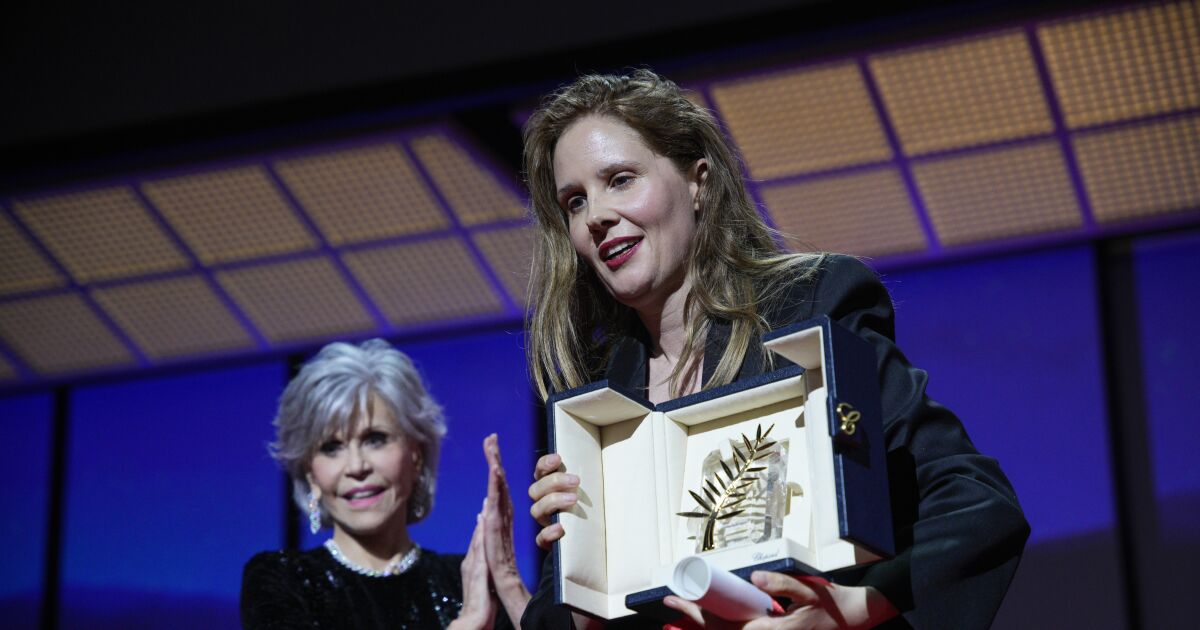
The French director Justine Triet became the third female filmmaker to take top honors at the Cannes Film Festival, winning the Palme d’Or from the competition jury on Saturday for her roundly admired dramatic thriller “Anatomy of a Fall” (“Anatomie d’une Chute”).
An emotionally intricate marriage story by way of a knotty courtroom drama, Triet’s movie — primarily in French, but with some English and German dialogue as well — was acquired mid-festival for U.S. distribution by Neon, extending the company’s recent streak of Palme winners including “Parasite” (2019), “Titane” (2021) and “Triangle of Sadness” (2022).
“Titane” itself was only the second Palme winner directed by a woman, the French auteur Julia Ducournau — something it accomplished decades after Jane Campion’s “The Piano” (1993) became the first. (Ducournau served on this year’s competition jury, which was presided over by “Triangle of Sadness” director Ruben Östlund.)
The nearly back-to-back Palme wins for Ducournau and Triet spoke to the rising number of female filmmakers in competition each year at Cannes, which has long been criticized for programming so few women in its most prestigious section. (Seven of the 21 directors in competition this year were women, a Cannes record.) But it also spoke to the demographics of the French film industry, where female directors are better represented than in many other countries, the U.S. included.
Triet received the Palme from Jane Fonda, who reminisced about the first time she came to Cannes decades ago: “There were no women directors competing at that time, and it never even occurred to us that there was something wrong with that .… We have a long way to go. But still, we have to celebrate change when it happens.”
Triet was joined onstage by her “Anatomy of a Fall” cast and crew, led by the German actor Sandra Hüller, who stars as a woman on trial for her husband’s murder. Hüller was one of the most prominent faces in the Cannes competition, having also costarred in “The Zone of Interest,” a disquieting, meticulously controlled Holocaust drama that had been widely tipped for the Palme.
Sandra Hüller in the movie “Anatomy of a Fall.”
(Cannes Film Festival)
Instead, the German-language “Zone of Interest,” written and directed by the British filmmaker Jonathan Glazer, was awarded the Grand Prix, or second place. Screened early in the festival, the movie proved an immediate critical favorite; it will be released in U.S. theaters by A24.
During his speech, Glazer said he wanted “to honor the memory of Martin Amis,” who wrote the 2014 novel from which “The Zone of Interest” was loosely adapted. Amis died last week, the same day the movie premiered in Cannes.
The French Vietnamese writer-director Trần Anh Hùng was named best director for “The Pot-au-Feu,” a French foodie’s delight that proved one of the late-breaking hits of the competition. Starring Benoît Magimel and Juliette Binoche as a 19th-century gourmet and his cook, this adaptation of a novel by Marcel Rouff charmed critics and audiences with its mouthwatering culinary sequences and genteel romance.
The jury prize, or third place, went to “Fallen Leaves,” a characteristically funny and melancholy romantic charmer from the Finnish writer-director Aki Kaurismäki. The award was accepted by Alma Pöysti and Jussi Vatanen, the movie’s stars, who read a speech from their director that ended with a joyous outburst: “Twist and shout!” It’s the first prize Kaurismäki has won at Cannes in more than two decades, since he took the Grand Prix for 2002’s “The Man Without a Past.”
The Japanese writer Yuji Sakamoto won the screenplay prize for “Monster,” an intricately structured three-part drama about an apparent school bullying incident that spirals out of control. The award was accepted by the movie’s director, Hirokazu Kore-eda, a Cannes fixture who won the Palme for 2018’s “Shoplifters.”
The screenplay honor was presented by John C. Reilly, who, in what could be interpreted as a gesture of support for writers striking in Hollywood, began his speech with a few moments of silence and then said, “What we just experienced was what a movie would be like without screenwriters.… Every film begins with an idea and the first thing we do is write it down.”
Kôji Yakusho won the best actor prize for his performance in “Perfect Days,” a warmly observed drama centered on a quiet, gentle-souled man who spends his days cleaning public toilets around Tokyo. The movie was widely hailed as the strongest narrative feature in many years for the German director Wim Wenders (“Paris, Texas,” “Wings of Desire”), who also premiered a new 3-D documentary, “Anselm,” about the artist Anselm Kiefer, out of competition.
The Turkish actor Merve Dizdar won the best actress award for her performance in the Turkish drama “About Dry Grasses,” in which she plays an independent-minded schoolteacher who draws (and sharply rebuts) the romantic attentions of two male friends. The movie was directed and co-written by Nuri Bilge Ceylan, a frequent Cannes prize winner who won the Palme for 2014’s “Winter Sleep.”
The Caméra d’Or prize, presented annually to a first feature from across all sections of the festival, was awarded to the Vietnamese director Thien An Pham for “Inside the Yellow Cocoon Shell” (“L’arbre aux Papillons d’Or”). The movie was a critical standout in Directors’ Fortnight, an independent program that runs parallel to the festival’s official selection; along with Trần’s win for “The Pot-au-Feu,” it completed a strong night overall for Vietnamese filmmakers.
The Palme d’Or for best short film was awarded to “27,” an animated work from the Hungarian director Flóra Anna Buda.
At an earlier ceremony held Friday, the top prize in Un Certain Regard, a sidebar program, was awarded to “How to Have Sex,” a well-received debut feature from the English director Molly Manning Walker.












